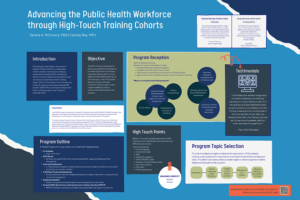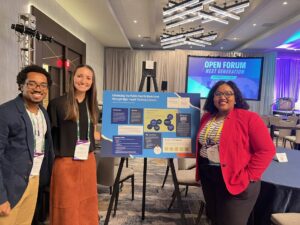About the EPIS Program
Evaluation and Program Improvement Scholars Program (EPIS) aims to build the capacity of STD program staff. The program is open to STD program managers, epidemiologists, program evaluators, intervention specialists, and CDC-funded STD programs. In a partnership among the Centers for Disease Control Division of STD Prevention, the National Coalition of STD Directors, and Rocky Mountain Public Health Training Center, EPIS cohorts are selected annually to work with coaches, who are proven leaders in evaluation and STD program management.
Our Work
The Evaluation and Program Improvement Scholars Program (EPIS) aims to build the capacity of STD program staff. As a collaboration among CDC, NNPHI, and the Rocky Mountain Public Health Training Center, EPIS aims to promote data use for program improvement.
The EPIS Program provides coaching and mentoring for cohort participants to work toward improving community health. Each cohort receives ten hours of individual coaching and virtual peer coaching, and coaches coordinate and lead a virtual learning exchange. Participants also have the opportunity to
Program Activities
1:1 Coaching
All EPIS sites and scholars are encouraged to meet monthly with their EPIS coach. Skilled in the areas of quality improvement, EPIS coaches provide individual technical assistance to EPIS sites and scholars. Scholars can use this time to discuss their projects at micro and macro levels and address quality improvement within their departments.
ECHO Series
Project ECHO provides a training experience to create sustainable change in healthcare and public health. Project ECHO, founded in 2003 at the University of New Mexico, provides a robust training model beyond the confines of four walls. ECHO follows the theory of ‘all teach, all learn’ and allows participants in the model to contribute to the discussion and real-life case students with a subject matter expert and faculty panelist after a 10-15 minute didactic presentation. Within EPIS, the ECHO series allows scholars to commiserate on a specific topic over 4-6 weeks and discuss solutions and cases to improve workplaces.
Live Learning Sessions
Live learning sessions meet the timely and specific needs of scholars in EPIS cohorts. These one-hour sessions are timely and live and require group discussions, breakout rooms, and the feedback of participants and coaches. EPIS scholars are encouraged to share real-life examples and scenarios to enhance the experience and cultivate community within the cohorts.
Virtual Learning Exchange
The Virtual Learning Exchange provides EPIS cohort participants with a more in-depth look at performance improvements, quality improvement, and special topics brought up in one-on-one sessions and project development during the program’s duration. The Virtual Learning Exchange place, within the middle of the program, allows coaches and subject matter experts who lead sessions to dive deeper into topics identified by EPIS Scholars. The exchange falls over 2-3 half days and mimics a conference.
Tips from Past Cohorts
“The background work is not flashy, and often everyone is stretched of time. Realizing the importance of dedicating time sets your entire team up for success. The focus on upstream activities such as setting up basic data management standards lead to better results at the end.”
”The program has increased buy-in from leadership. The structure setting to come back to coaching meetings helped to dedicate time to do the work.”
Our Impact
EPIS scholars share that the coaching experience directly supports the work they do:
“Our coach was extremely helpful in making us think about aspects we had not considered and
connecting us with other states that had done similar assessments.””The coaching helped us to work through an evolving project definition as the process was
taking shape, allowing for real-time discussion and problem solving as the project evolved.”
The EPIS Administration Team, Cassidy Ray from RMPHTC, and Serena McCovery from NNPHI shared program results at the 2023 Open Forum in Indianapolis, IN. They were joined by longtime EPIS Coach Robert Hines.
Related Resources
Contact Us
Please reach out to Serena McCovery, Senior Program Manager at smccovery@nnphi.org with any questions or to learn more.
Under DSTDP’s cooperative agreement to support STD prevention and control (PS 19-1901 STD PCHD), STD programs are expected to conduct data-driven planning, analysis, monitoring, and evaluation for program improvement under Strategy Area V. The EPIS program is designed to support successful implementation of Strategy 17.
This project is supported by the Centers for Disease Control and Prevention of the U.S. Department of
Health and Human Services (HHS) as part of a financial assistance award (CDC-RFA-OT18-1802:
Strengthening Public Health Systems and Services Through National Partnerships to Improve and Protect
the Nation’s Health) totaling $175,000 with 100 percent funded by CDC/HHS. The contents are those of
the author(s) and do not necessarily represent the official views of, nor an endorsement, by CDC/HHS,
or the U.S. Government.


 Subscribe To Our Communications
Subscribe To Our Communications